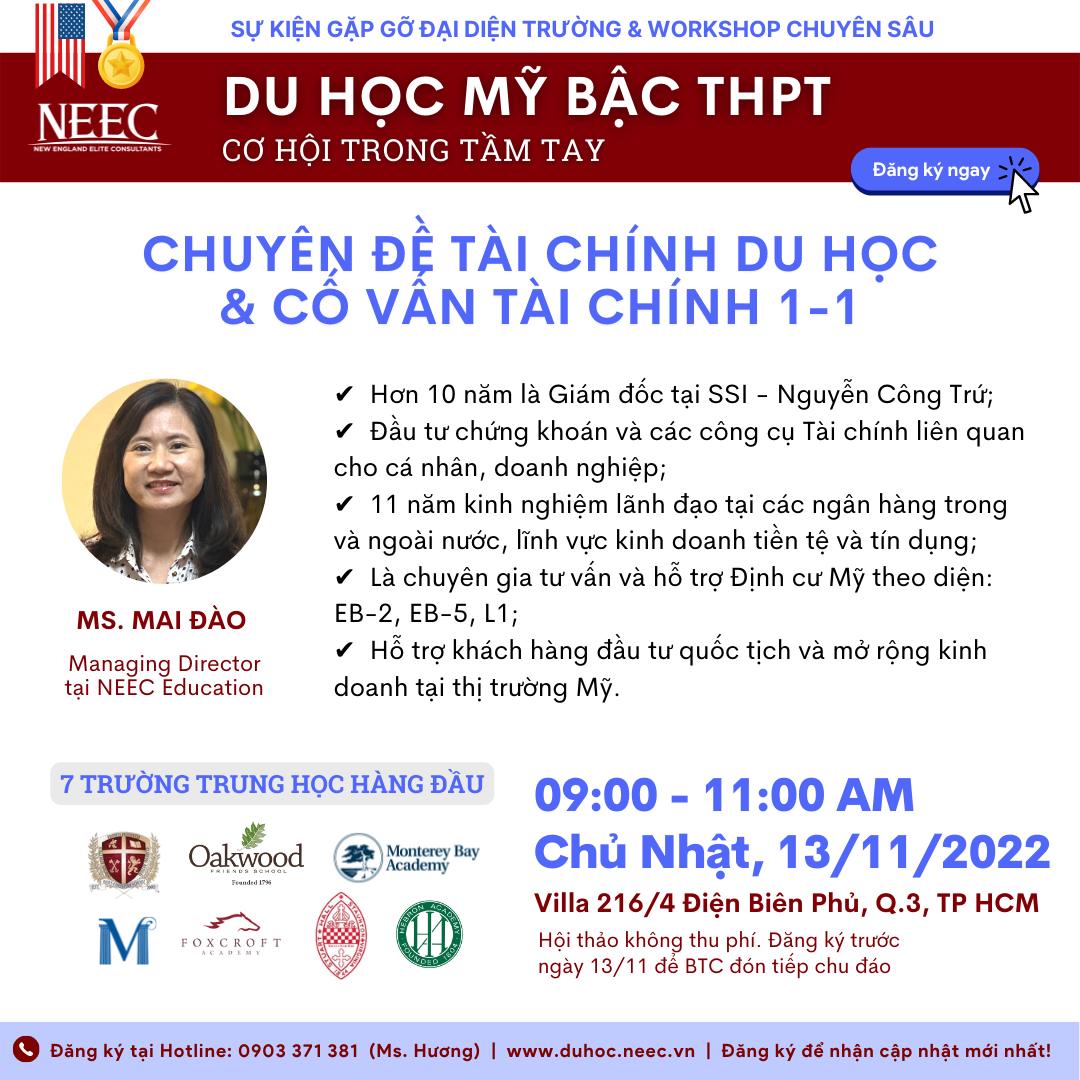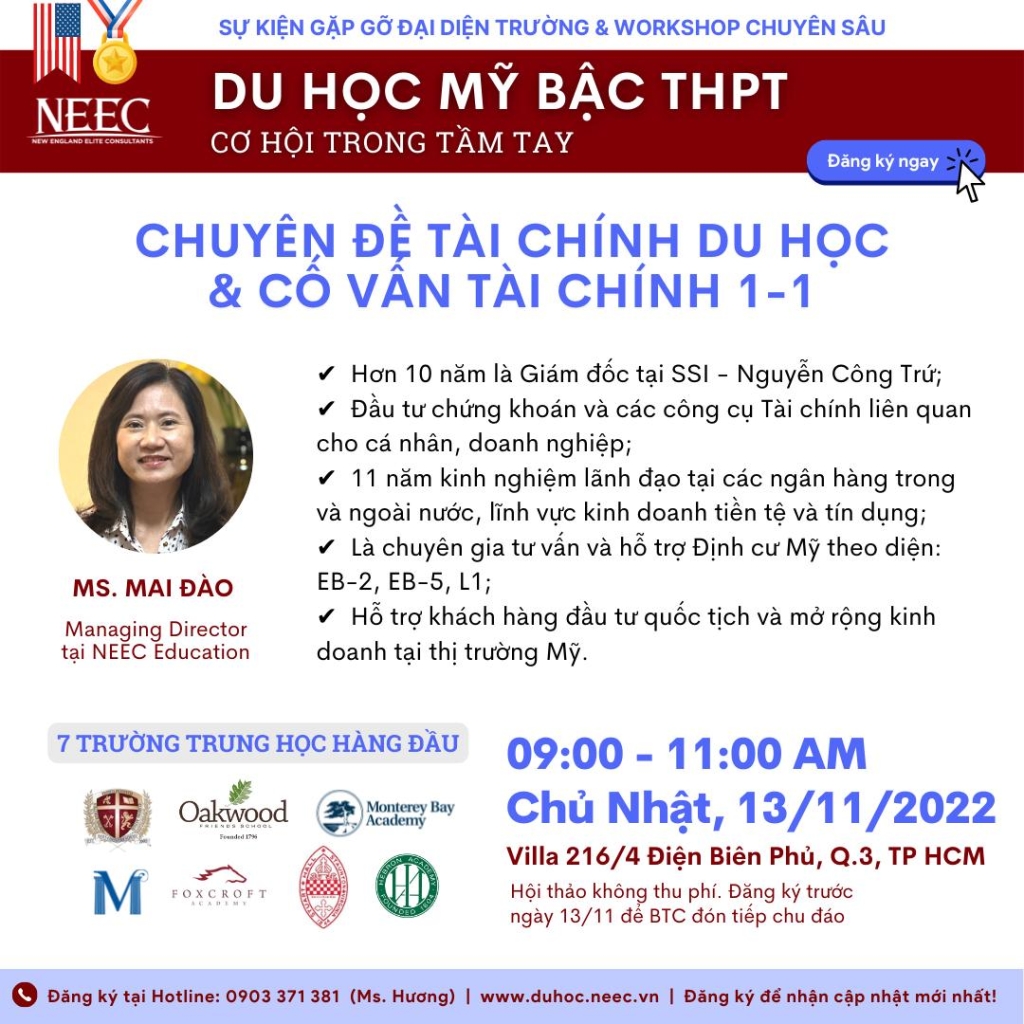
“It can be seen that during the recent pandemic, many issues arose. If parents had prepared their children’s financial matters well in advance, they would have been able to get through the difficult period. However, if the financial plan is not clear and strong enough, the children studying abroad will be affected,” Ms. Đào Nhật Mai shared with NEEC Education.

STUDYING ABROAD IN THE U.S. AT THE HIGH SCHOOL LEVEL
IMPORTANT FINANCIAL PLANNING CONSIDERATIONS
Why do you think financial matters are important for parents to consider before their children study abroad, especially at the high school level?
According to Ms. Mai, financial matters are a significant concern for all parents when considering sending their children abroad. The cost difference between studying in high school and university in the U.S. is quite clear. Based on her research, studying at the high school level in the U.S. can cost around $40,000 – $60,000 per year, while university costs less due to longer and less intense periods, so the investment will be slightly lower. Especially when a family has multiple children, the cost will be even higher. Therefore, she believes this should be a top priority for families because if there is no clear investment plan, when the child arrives in the U.S., they may be overwhelmed. Everything will not be stable or clear.
With what you mentioned, studying abroad at the high school level will be more expensive than at the university level, and if we don’t invest fully and clearly, the child studying abroad will face many inconveniences and uncertainties. With your experience of sending your children to study abroad early, could you provide advice and delve deeper into how to prepare for studying abroad?
Every family will have different study abroad orientations and plans for their children based on financial capabilities, depending on the child’s adaptability, talents, and independence. Personally, Ms. Mai thinks if the child is not quick-witted, cannot be independent, and lacks adaptability, they should not be sent to study abroad early.
In Ms. Mai’s case, the reason she and her husband decided to send their children abroad early is because both are boys and both have been independent from an early age due to a non-restrictive and non-imposing upbringing. Compared to her acquaintances, not everyone is like her family. To begin giving her children autonomy in everything, for example, she allowed both children to ride bicycles to school from elementary school. The children were trained to remember routes, be proactive, and handle situations, gradually forming a habit of independence and autonomy. However, she always ensured that her children were not overly protected by family members when they went to study abroad in the U.S. She tried not to let her children rely too much on relatives. After the first year in New York, she sent both to Boston and finally to California for university.
As she mentioned earlier, the conditions for sending children abroad will entirely depend on financial capabilities, time, and the children’s abilities. The earlier, the more expensive, but the earlier, the more beneficial because the children get to experience and get used to everything, and somehow, the results they bring back will be better than those who don’t get to go early. The high school program will also help them understand everything thoroughly to make better decisions when entering university. But she reiterated, how and when to study abroad still depends on financial capabilities and the children’s adaptability. From her personal perspective, after a period of time, she believes it was a good decision.
Studying abroad is not just about early investment yielding a return on investment (ROI); it is very different from business investment. Educational investment is an investment with intangible value, things that cannot be measured. If possible, one of the things that we can clearly visualize about the level of investment is: for example, sending children to study early increases their chances of receiving scholarships. Educational investment is very difficult to weigh in terms of profit and loss.
When studying at high schools and universities in the U.S., will the schools offer financial aid to reduce the burden? Ms. Mai, you have researched a lot about the financial aid system at schools. Could you explain more to parents and students?
Financial aid is a policy that provides financial support from three main sources: (1) the school, (2) the federal government, or (3) the state government to reduce the financial burden on students. Financial aid is divided into two types: Merit-based and Need-based. Merit-based financial aid is evaluated and awarded based solely on the student’s academic performance. Need-based financial aid is granted based on the family’s needs, as demonstrated by documented proof of actual income compared to the family’s expenses (for students needing financial assistance when the family’s income is low).
Although financial aid at the high school level is not as extensive as at the university level, depending on the school’s policies, students can receive different aid packages.
It’s worth noting that studying abroad early also partially increases the chance of receiving financial aid at the university level due to advantages such as high GPA scores (which are easier to verify compared to equivalent grading systems from other countries) or benefits when considering English certificates, and the time spent studying in the U.S. makes the admission process easier. This will give you an edge in your application and help university admissions committees consider and prioritize you more.
What issues arose after you sent your two children to study in the U.S., even when your financial plan was in place? How did you handle them?
Everything comes with risks. We can see that during the recent pandemic, many issues arose. All family business plans and directions were disrupted. If parents had prepared their children’s financial matters well in advance, they would have been able to get through the difficult period. However, if the financial plan is not clear and strong enough, the children studying abroad will be affected, such as 1/ Bringing them back to Vietnam or 2/ Having them take a gap year. Ms. Mai thinks that when parents have well-prepared and thoroughly planned each step from the beginning, their children’s study abroad experience will be safeguarded, avoiding waste.
ORIENTING YOUR CHILDREN’S CAREERS
LISTEN AND RESPECT
According to you, how important is career orientation for your children?
According to Ms. Mai, career orientation changes over the years. She is speaking from the perspective of a parent. Ten years ago, parents would say something, and their children would follow, without any ideas about a career. However, this is not the case for every young person today. She sees that the younger generation now has a very early orientation for their future and personal opinions about choosing a career to pursue. They will have their own strengths from what they do, self-study, and self-experience, which is much better than being oriented.
Ms. Mai thinks the important thing now is to prioritize students first; they will have their own views and orientations about their desired field of study and career. As for parents, they should sit down and actively listen to their children’s opinions and give feedback: strengths, weaknesses, and advantages of each career. Both parties should sit together and come up with a common set of career options for the children to choose from, possibly with additional consultation from teachers and experts. In the U.S., it is not necessary to study a specific subject, as there are many groups of schools or subjects to serve students’ needs. Schools also have a transfer policy for students to change majors according to their preferences.
In the process of orienting your child, how can you be more impartial in advising and not just follow the parent’s personal thoughts?
It’s very difficult for parents to be more impartial in orienting their children because they always want the best for their children based on the parents’ personal experiences. Whether parents can let go of imposing their ideas on their children, Ms. Mai thinks that can only be limited, and respecting the child’s opinion more is key. Therefore, we should also consult a third party to gather more opinions. For Vietnamese people, they think that relatives in the U.S. can advise their children more accurately. However, she doesn’t think so. Ms. Mai believes that perspectives on education in the U.S. or Vietnam can be broad but not necessarily the most accurate, and if they are not in the field, they cannot fully understand that educational system. Our job is to find those who are truly experts in that field to consult the most accurate information.
Today’s youth always want to fully decide their study abroad orientation. And if they fail, they are ready to take responsibility for it. As a parent, what do you think about this?
Ms. Mai sees that most young people today are like that. The younger generation has very clear views; they want to be proactive in their lives and take responsibility if something goes wrong. In every aspect of a child’s life, parents can only offer advice and support, but they cannot make all the decisions. Even in choosing a major. Many young people studying abroad switch majors or change majors when they find a greater passion.
If parents have carefully researched and accompanied their children from a young age, they can offer more refined and appropriate suggestions. The agreement between parents and children is the best way to ensure future success. The role of parents is to support and guide.
* This interview is part of the Event: U.S. High School Study Abroad Day: Opportunity within Reach, organized by NEEC Education.

OPPORTUNITY TO MEET AND INTERVIEW DIRECTLY WITH 7 REPRESENTATIVES FROM LEADING U.S. HIGH SCHOOLS
👇 Register for a direct interview with school representatives now!
At the upcoming NEEC Education U.S. High School Study Abroad Day on 13/11, parents and students will have the opportunity to converse and interview with 7 U.S. High School Representatives and have the chance to receive scholarships and financial aid up to 50%!
✔️ The representatives from 7 high schools, including Principals & Admissions Representatives, will help parents and students address concerns about the admissions process, training quality, and student life in the U.S. Still unsure about choosing a major and school? This event is the perfect opportunity to get the most accurate information directly!
✔️ Students who register for a direct interview with school representatives will have the chance to receive scholarships and financial aid up to 50%! When attending, parents and students should bring documents including the following information to interview directly with the school representatives:
– The last 3 years’ transcripts;
– English certificates;
– Extracurricular activity certificates (if any).
✔️ Join NEEC in exploring top U.S. high schools and choose the school you want to interview and receive the most scholarships from:
1. Maumee Valley Country Day School (#2 in Ohio)
2. Oaks Christian School (#5 in California)
3. Monterey Bay Academy (#11 in California)
4. Oakwood Friends School (#18 in New York)
5. Hebron Academy (#5 in Maine)
6. Foxcroft Academy (#10 in Maine)
7. Stuart Hall School (#14 in Virginia)
Seminar: U.S. HIGH SCHOOL STUDY ABROAD – OPPORTUNITY WITHIN REACH
⏰ Time: 9:00 – 11:00 AM, Sunday, 13/11/2022
📍 Location: Villa 216/4 Điện Biên Phủ, Q.3, HCMC
📞 Register via Hotline: 0903 371 381 or fill out the form at https://duhoc.neec.vn/ngay-hoi-du-hoc-my-bac-thpt/
The seminar is free. Register before 12/11 to allow the organizers to prepare a warm welcome.
📌 To seize the opportunity for successful U.S. study abroad, join the seminar and interview with school representatives, only on 13/11/2022!